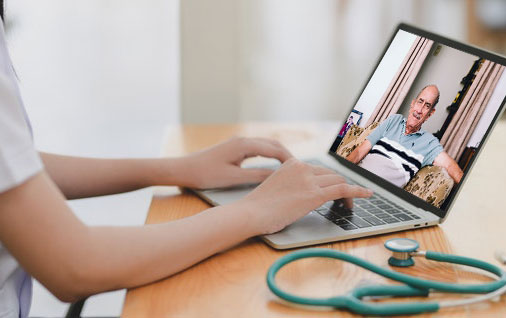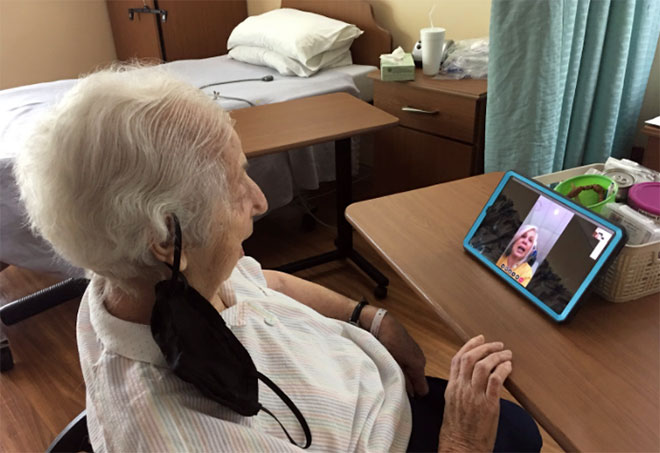The coronavirus outbreak, and the social distancing it has mandated, is transforming the way people visit their doctors. For older adults, including people living with dementia, telemedicine is allowing care to go virtual — and that has big advantages. But do those outweigh the benefits of in-person care?
For people with dementia, the benefits of telemedicine — delivering clinical services remotely — offers several advantages. Patients do not need to travel to the doctor’s office, which can be an expensive and challenging undertaking, a source of agitation for some people with dementia.
Communication is improved, visits can be more frequent, and doctors can see more patients than bandwidth might otherwise allow.
Ipsit Vahia, a geriatrics psychiatrist at McLean Hospital, adds that doctors can also see patients in their home environment, giving them a sense of how they interact with people who are part of their everyday lives.
Researchers also found that unlicensed dementia care navigators, who provided telephone-based care with support from a dementia specialist team, not only improved the quality of life of people with dementia and reduced emergency department visits, but they also decreased caregivers’ burden and depression.
“The coronavirus crisis has actually launched telemedicine from being a relatively novel approach to becoming the accepted standard of care not just in the US but most of the world,” Vahia told Being Patient. “At this point while we remain in quarantine, telemedicine has become the primary way to deliver care, at least for most people outside the hospital setting.”
While telemedicine has been around for several decades, the public health crisis has prompted lawmakers to expand remote healthcare services of federal insurance program Medicare, previously available only to people living in remote areas and for specific checkups.
When a resident in an assisted living facility of Boston was infected with COVID-19, Vahia used a device to monitor his patient from home. The device, known as “Emerald,” emitted wireless signals reflecting off of the resident, using algorithms to analyze those patterns and infer the patient’s persons’ breathing rate, sleep patterns and movement.
Vahia observed that the patient’s breathing rate began returning to normal as she recovered. Her sleep quality was improving and she was walking more quickly around the apartment.
Telemedicine may also make health visits more inclusive (for family members who may not otherwise have been able to join), and expand doctors’ reach to see more patients, especially those without easy geographic access to neurological specialists, according to Michael Erkkinen, a cognitive and behavioral neurologist at the University California, San Francisco, Memory and Aging Center Clinic.
Telemedicine also has its limitations, Erkkinen noted. For one thing, physical examinations and cognitive testing may be less precise and reliable. Seeking telemedicine may also be difficult for people with limited access to tablets and smartphones.
The UCSF Memory and Aging Center Clinic is temporarily conducting all of its clinical visits virtually during the lockdown. While Erkkinen is optimistic about the ongoing and future role of telemedicine, he hopes that the complete switch to telemedicine would only be temporary.
“There’s something about being able to feel the pulse, to lay your hands on someone when you’re doing the neurological exam that may have unforeseen benefits both in establishing rapport and also a therapeutic patient-doctor relationship,” Erkkinen said.
“[Telemedicine] has a really important place, probably a larger place than it had before,” Erkkinen said. “But it certainly does not replace the in-patient care that we provide.”





